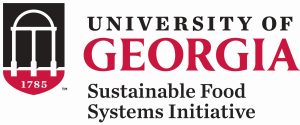The Certificate in Sustainable Food Systems is available to students interested in taking an interdisciplinary approach to understanding, communicating and participating in finding solutions to the grand challenges we face for sustainable food production, access and utilization. Advances in agricultural and environmental sustainability, public health and nutrition, and economic and social well-being call for systemic and interdisciplinary research, which in turn require mechanisms for developing partnerships and collaboration. In response to these needs, the interdisciplinary graduate certificate program in Sustainable Food Systems (SFS) will expand opportunities for graduate training and faculty collaboration across several related units across campus.
If you would like to apply for the graduate certificate in Sustainable Food Systems, fill out the SFS Certificate Program of Study Form and the Curriculum Change Request Form (found on the Registrar’s Office webpage) and return both documents to the Certificate Coordinator at jjthomp@uga.edu.
Requirements
Students are required to take a minimum of 13 credit hours to earn the Certificate in Sustainable Food Systems. Of these credit hours, at least 7 hours will be acquired from core courses in three different areas of emphasis: Foundational/ Systems Learning, Food Systems Service-Learning, and Professional Development. At least 6 credit hours will be acquired from elective courses outside of the student’s home department. The certificate consists of the following components:
CORE COURSES (7 CREDIT HOURS)
1. Foundational/Systems Learning Course: Students will be introduced to the concept of the food system as a complex adaptive system and explore additional concepts of scale, resiliency, connectivity, and interaction of the various parts of the system. The course will explore how different lenses and perspectives from different disciplines come together in solving problems and the importance of transdisciplinary approaches needed to solve these complex problems. Finally, the course will explore how mental and mathematical modeling approaches are used to facilitate holistic approaches to problem solving.
- AESC 8310 – Food Systems Sustainability, Security and Resilience (3 cr)
2. Food Systems Service-Learning Courses: Choose one of the two courses; the alternate course can be used as an elective. Both courses aim to help students develop awareness of key food system issues in the local community and engage students in efforts to increase the sustainability of the local food system.
- GEOG 6890 – Athens Urban Food Collective (3cr)
- CRSS 6020S – Social Sustainability in Ag & Food Systems (3 cr)
3. Professional Development Course: Choose one of the following courses, which support students to develop the skills necessary to address real-world problems and to communicate their understanding of food system processes to diverse audiences.
- AGCM 8700 – Communicating Agricultural and Environmental Scientific Innovation (3 cr)
- AGCM 8710 – Agriculture and Environmental Science Communication Theory (3cr)
- AGCM 8750 – Effectively Communicating about Emerging Agricultural and Environmental Science Issues (3 cr)
- GRSC 8200 – Communicating Research and Scholarship (1-2cr)
SFS Certificate Core Course Availability
| Semester | Course |
|---|---|
| Spring 2025 | AESC 8310 (3cr) GEOG 6890S (3cr) |
| Fall 2026 | AGCM 8710 (3cr) |
ELECTIVE COURSES (6 CREDIT HOURS):
Student must complete two courses outside of home department (Select from the list of electives below, or seek approval for alternatives from the certificate coordinator):
Electives
| Course Prefix & Number | Title |
|---|---|
| AAEC 6640 | Food and Fiber Marketing and Merchandising |
| ADSC 6000 | Sustainability of Resilient Global Food Systems |
| AGCM 8100 | Culture Centered Communication and Engagement |
| AGCM 8710 | AES Communication Theory |
| ALDR 6600 | Global Issues in Agriculture and the Environment |
| ALDR 6710 | International Agricultural Development |
| ALDR 8080S | Community Research Methods |
| ANTH 8515 | Institutional Dimensions of Sustainability |
| CRSS 6010 | Sustainable Agricultural Management |
| CRSS 6020S | Social Issues in Sustainable Agriculture |
| CRSS 6030 | Sensors in Precision Agriculture |
| CRSS 6050 | GIS for Nutrient and Energy Efficiency |
| CRSS 6060 | Advanced Topics in Precision Agriculture |
| CRSS 6220 | Sustainable Agriculture Systems |
| CRSS/HORT 6400 | Agro-ecology |
| CRSS/HORT 6590 | Soil Fertility and Plant Nutrition |
| CRSS/ENTO 6740 | Integrated Pest Management |
| CRSS/HORT/ANTH/GEOG 6931 | Agroecology of Tropical America Field Trip |
| CRSS 8410 | Adv. Topics in Sustainable Agriculture Management |
| ENTO 6500E | Biological Control of Insects (asynchonous course) |
| ENVM 6650 | Environmental Economics |
| ENVM 6800 | Water Resource Economics and Management |
| FANR 6020 | Sustainable Development |
| FANR 7860 | Natural Resource and Environmental Economics |
| FCID 6200 | Sustainability Seminar |
| FDST 6100 | Government Regulation of Food Safety & Qualty |
| FDST 7180E | Marketing of Value-Added Foods |
| FISH 6550 | Sustainable Aquaculture |
| GEOG 6810 | Conservation Ecology and Resource Management |
| GEOG 6860 | Industrial Agro-Food Systems and Its Alternative |
| GEOG 6890 | Athens Urban Food Collective |
| HORT 6030S | Sustainable Community Food Production |
| HORT 6050 | Greenhouse Management I |
| HORT/ENTO 6125 | Organic Agricultural Systems |
| HORT 6440 | Environmental Physiology |
| HORT 6990 | Environmental Issues in Horticulture |
| HPAM 7050(E) | Health Policy and Obesity |
| NUTR 6540 | Public Health Nutrition |
| NUTR 6630 | Cultural Aspects of Nutrition |
| NUTR 6640(E) | Food Sanitation and Safety |
